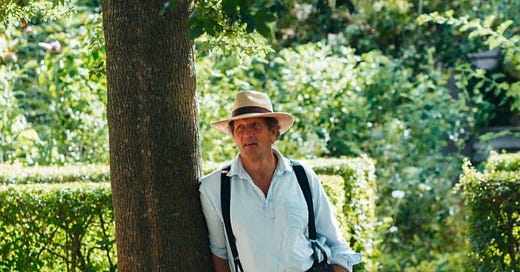After their deaths, certain writers burst out of the narrow confines through which we viewed them in life. Keats was mocked as sentimental in his time, only to rise to the heights of universal regard after his early passing. Emily Dickinson, who lived as an unknown recluse for her whole adulthood, is now considered one of America’s greatest poets.
And though I hope that his passing is still a very long way away, it seems likely to me that Monty Don, now recognized primarily as a broadcaster and the host of BBC shows like Gardeners World and Big Dreams, Small Spaces, will one day come to be known for what he really is: a stunning polymath and brilliant memoirist of life in the natural world.
During the early months of the pandemic, my wife and I developed a life-sustaining tradition: every night we would make a cocktail—usually a rather beefy Toronto—and sit down for an episode or two of Gardeners World. Isolated at his home in Longmeadow, Don carried on gardening during the very leanest months of isolation. The zen atmosphere of the show was an instant comfort, but I can remember the distinct moment when I realized that, with Monty Don, I was dealing with something much more than a good TV broadcaster. After a broad green establishing shot punctuated by the snick of his spade and the gurgle of a sparrow’s song, this impeccably-dressed Englishman turned toward the camera and said “I am going to plant something now, because planting is an act of hope.”
Like all great writers, Monty Don can take what’s in front of him in the concrete world and draw metaphorical significance from it. Gardeners World duly became an international sensation in 2020, and not just because people wanted good advice about how often to water their lemon trees. For Don, whose knowledge about plants and landscape design is probably greater than that of anyone else alive, a garden is a world in miniature, a place where art meets life in generous profusion.
But it isn’t just his knowledge and enthusiasm that set him apart: these would only be enough to make him a great presenter. It’s his skill with a pen that makes him more. Take this throwaway passage from last July’s “Advice” section on his website:
Regardless of the weather, July is the summation of summer, the month when the days are still long, the growth as full as it ever might be and with none of the slight weariness that can shadow August. It is the month of school holidays, and the garden flows and swells with both floral and edible harvests.
What’s worth noticing about this passage, apart from its symmetry, imagery, and sonorous turns of phrase, is that it doesn’t provide any advice. Don has plenty of advice to give, but that’s not what the website is really about. Cleverly disguising it as a how-to column, Don has tricked us into an encounter with something more: a rolling collection of naturalist essays equal—dare I say superior?—to anything we’d find in John Muir. He’s less grandiose than Muir, anyway, and I’ve always admired restrained writers. Wisely, Don saves the flowery stuff for the garden and keeps his sentences as cleanly raked as a raised bed in winter.
We seem to be living at a time when great writers have to promise us something practical before we’ll listen to them. That’s a bit of a shame, but not entirely an evil state of affairs if it produces more writers like Monty Don. For all his expertise, it’s not his know-how that history will remember him for. It is not even his wonderful hats. Instead, when the dust has settled on his busy and generous life, we’re going to find ourselves in possession of a tall stack of the best nature writing in a century, a contribution not just to the world of horticulture but to the landscape of English letters; a living body of work that, with the gentle strength of a root, can’t help but break through whatever confines we try to put it in.
Like what you’re reading here? The best way to help out is to spread the word. Your friends are good people—they deserve good writing, too.




